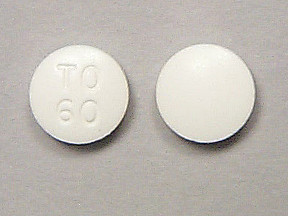TOREMIFENE - ORAL
PHONETIC PRONUNCIATION: (tor-EM-eh-feen)
COMMON BRAND NAME(S): Fareston
GENERIC NAME(S): toremifene citrate
Uses
USES: Toremifene is used in postmenopausal women to treat breast cancer that has spread to other parts of the body (metastatic breast cancer). It is usually used to treat cancer that needs estrogen, a female hormone, in order to grow (estrogen-receptor positive). Toremifene is a nonsteroidal antiestrogen that blocks the effects of estrogen in the breast tissue, thereby slowing or stopping the growth of cancer.
How to use TOREMIFENE - ORAL
HOW TO USE: Take this medication by mouth with or without food, usually once daily or as directed by your doctor. Dosage is based on your medical condition and response to therapy. Use this medication regularly to get the most benefit from it. To help you remember, take it at the same time each day. Avoid eating grapefruit or drinking grapefruit juice while using this medication unless your doctor or pharmacist says you may do so safely. Grapefruit can increase the chance of side effects with this medicine. Ask your doctor or pharmacist for more details. Since this drug can be absorbed through the skin and lungs, women who are pregnant or who may become pregnant should not handle this medication or breathe the dust from the tablets. Inform your doctor right away if your condition worsens (e.g., you get new breast lumps).
Side Effects
Precautions
Interactions
Overdose
Images
Reviews
Faq for TOREMIFENE - ORAL
Toremifene is an oral medication that belongs to a group of drugs called selective estrogen receptor modulators (SERMs). It is primarily used to treat breast cancer in postmenopausal women.
Toremifene works by blocking the effects of estrogen in the breast tissue, which helps to slow down the growth of cancer cells. It also acts as an estrogen agonist in some tissues, such as bone, improving bone density and reducing the risk of osteoporosis.
The recommended dosage of Toremifene is 60 mg taken orally once daily with or without food.
Common side effects of Toremifene may include hot flashes, vaginal discharge or dryness, sweating, nausea, dizziness, and fatigue. It may also cause changes in vision, such as blurred vision or difficulty seeing colors.
No, Toremifene is not approved or recommended for use in men. It is specifically indicated for postmenopausal women with breast cancer.
The duration of Toremifene treatment may vary depending on the individual's response and specific situation. It is important to follow your doctor's instructions regarding the duration of treatment.
If you miss a dose of Toremifene, take it as soon as you remember. However, if it is close to the time for your next dose, skip the missed dose and resume your regular dosing schedule. Do not double the dose to make up for a missed one.
It is generally recommended to avoid alcohol consumption while taking Toremifene. Alcohol may increase the risk of certain side effects and may interfere with the effectiveness of the medication.
Toremifene may increase the risk of blood clots, stroke, and endometrial cancer. It is important to discuss your medical history and any potential risks with your doctor before starting treatment. Regular monitoring and screening may be required during treatment.
Warning
WARNING: Toremifene has caused very serious (possibly fatal) heart rhythm problems (QT prolongation in the EKG, torsades de pointes). Get medical help right away if any of these rare but serious side effects occur: fast/irregular heartbeat, seizures, severe dizziness, or fainting. The risk of QT prolongation may be increased if you have certain medical conditions or are taking other drugs that may affect the heart rhythm. Before using toremifene, tell your doctor or pharmacist of all the drugs you take (see also Drug Interaction section) and if you have any of the following conditions: certain heart problems (heart failure, slow heartbeat, QT prolongation in the EKG), family history of certain heart problems (QT prolongation in the EKG, sudden cardiac death). Low levels of potassium or magnesium in the blood may also increase your risk of QT prolongation. This risk may increase if you use certain drugs (such as diuretics/"water pills") or if you have conditions such as severe sweating, diarrhea, or vomiting. Talk to your doctor about using toremifene safely.
Disclaimer
IMPORTANT: HOW TO USE THIS INFORMATION: This is a summary and does NOT have all possible information about this product. This information does not assure that this product is safe, effective, or appropriate for you. This information is not individual medical advice and does not substitute for the advice of your health care professional. Always ask your health care professional for complete information about this product and your specific health needs.

No Reviews Yet